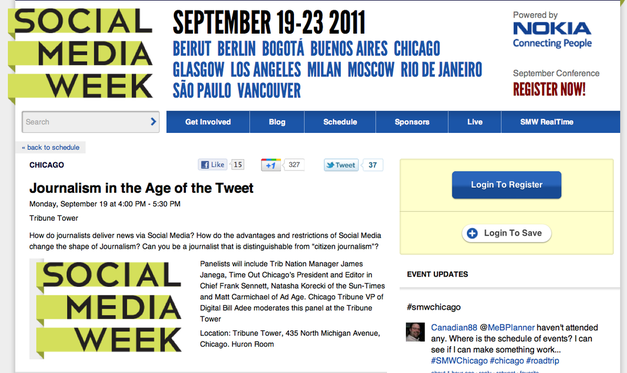
Korecki and other panelists discussed "Journalism in the Age of the Tweet" today as part of Social Media Week, the huge international undertaking that, according to its website, "brings hundreds of thousands of people together every year through learning experiences that aim to advance our understanding of social media's role in society."
About 100 people attended the journalism panel at the Tribune Tower in downtown Chicago. The moderator, Bill Adee, vice president of digital at the Chicago Tribune, said 5.1 million people function online in the metropolitan area, and that 80 percent are on Facebook and 17 percent are on Twitter. Four out of every five people in the room raised a hand when Adee asked who had tweeted at least once today. For those wondering what to tweet, he offered this good advice: one-third personal, one-third business or professional, one-third informational.
Trib Nation Manager James Janega; Frank Sennett, Time Out Chicago's president and editor in chief, and Matt Carmichael, director of information projects at Advertising Age, joined Korecki on the panel. Janega offered this truism concerning the age-old question of how to make pitches to journalists: Twitter is a great way to maintain a relationship, but not so good for starting one. Asked what other social media Ad Age employs, Carmichael said: "I think the action for us right now is Twitter. Whether that's true a year from now, who knows?"
While acknowledging "the world we live in now is immediate feedback," Sennett also spoke of the danger that social media poses for journalists. "The danger of how it has changed us ... is that you chase the page views." By that, he means, newsroom managers must be wary of focusing on what they think the public wants at the expense of what it needs to maintain a functional democracy and a safe and informed community. Very good point.
 RSS Feed
RSS Feed
